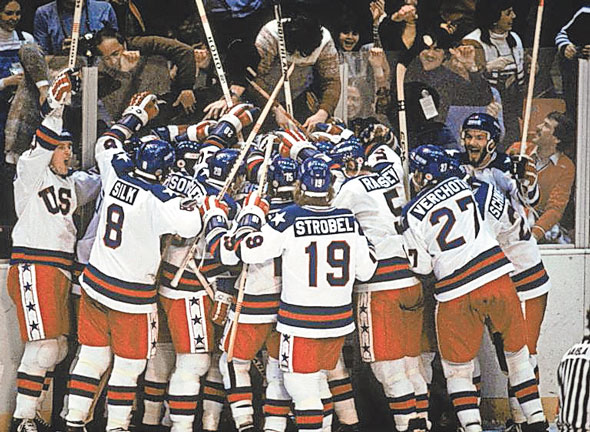
My brother Joe and I don’t see eye-to-eye when it comes to our sports fandom.
He’s a Yankees fan, and I’m a proud Mets fan. He’s Jets, I’m Giants. He’s Knicks, I’m Nets. He’s Rangers, I’m Devils.
But despite our differences, we are both passionate sports fans. That passion was evident each time we watched the 2004 Disney movie “Miracle,” which chronicles the U.S. men’s hockey team’s improbable victory over the mighty Soviet Union at the 1980 Winter Olympics in Lake Placid, N.Y.
Every time our family drove to Florida, Joe and I watched that movie. We put our sports differences aside for two hours — staring in awe at how one of the most memorable sports moments ever unfolded.
Now 40 years later, the sports world still remembers how that single ice hockey game lifted a nation in desperate need of a lift.
Father Ed Kachurka, pastor of Mary’s Nativity-St. Ann, Flushing, also remembers the impact of that game, now referred to as the “Miracle on Ice.” A devout sports fan himself, he became a hockey fan by playing roller hockey on his dead-end street in Flatbush.
As a hockey lover, Father Kachurka took an interest in the Winter Olympics. If you followed the Winter Games in the 1960s and 1970s, you knew full well of the Soviet Union hockey team’s dominance.
From 1964 through 1976, the Soviets won four straight gold medals. In fact, during that stretch, the team lost only one game and had only one tie. Naturally, they were the heavy favorites heading into the 1980 Winter Olympics.
Three days before the XIII Games, the Russians visited Madison Square Garden to take on the U.S. — a young group of college hockey players. The final result: 10-3 Soviet Union, an utter drubbing that all but confirmed a fifth straight Olympic gold.
As the Games began, the U.S. team got off to a surprising start with a draw against Sweden. The team then rattled off four straight wins over Czechoslovakia, Norway, Romania and West Germany to set up a semifinal showdown with the Soviet Union, which won all five games and averaged more than 10 goals per game — sheer dominance.
On Feb. 22, 1980, Father Kachurka was a junior at Cathedral College in Douglaston. Like so many fellow Americans, he watched on tape delay, because ABC broadcasted the game during local primetime hours.
“We didn’t know anything,” Father Kachurka said. “There was no internet; there were no cellphones; there was nothing.” Except maybe a glimmer of hope after the first period, when a Mark Johnson goal off a deflection tied the game 2-2.
“It was exciting … very exciting,” Father Kachurka said. “Here we are with a little bit of luck. We tied them with a few seconds left on the clock.”
The Soviet Union took a one-goal lead heading into the third period. A second goal from Johnson again tied the game, setting up the heroics of Mike Eruzione, whose goal put the U.S. ahead 4-3 with exactly 10 minutes to play.
“We had the young kids,” Father Kachurka said. “They kept on pressing and shooting. The Russians were shooting like crazy at the goalie, shots you normally wouldn’t take.”
As 8,500 fans nervously looked on at the Lake Placid Field House, the clock continued to wind down. With the crowd chanting, ABC sportscaster Al Michaels delivered the line that made him an instant legend.
“Five seconds left in the game. Do you believe in miracles? Yes!”
“All of a sudden the place went crazy,” Father Kachurka said. “There’s an old saying that can be used in any sport: Any team can win on any day. Against that Russian hockey team, you would need a miracle in order to win. And sure enough, on that particular day they pulled it off.”
Of course, the U.S. team went on to defeat Finland to capture the gold medal. Yet, when we think back to 1980, it’s the win over the Soviet Union that stands out.
In a tumultuous time in our nation’s history, we needed the victory to temporarily divert attention from the Soviet Union’s invasion of Afghanistan during the Cold War, to the hostage situation in Iran, to gas shortages on American soil. Seeing 20 college kids defy the odds in the ultimate David vs. Goliath matchup uplifted the country.
In the early 1990s, Father Kachurka visited the Lake Placid arena, now named after the U.S. team’s head coach Herb Brooks. He skated right to the spot where the players all piled up after the miraculous victory.
Unlike Joe and I, Father Kachurka has never seen the movie “Miracle.” And there’s really no need for him to do so, because he lived through one of the most iconic sports moments of all-time.
Even the magic of Disney cannot fully reproduce that feeling.
Contact Jim Mancari via email at jmmanc@gmail.com.
